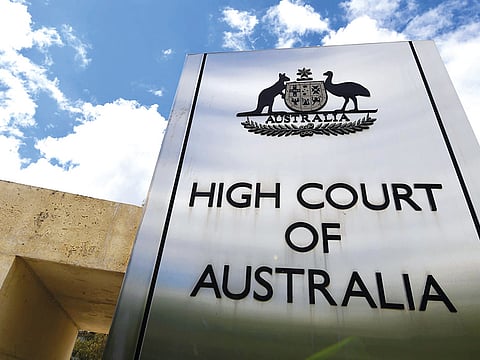High court upholds government’s controversial fast-track refugee process
The case was the first time the fairness of the system had been challenged in the high court

Canberra: The high court has upheld the Australian government’s controversial fast-track refugee assessment process after finding that a new body set up to review the claims of people who arrived by boat does not have to adhere to all the requirements of the Migration Act.
The decision is based on an application by an Iranian man who was denied a temporary protection visa in 2016 after his application was reviewed by the Immigration Assessment Authority (IAA), a fast-track body established to review the cases of “unauthorised maritime arrivals” who entered Australia between August 13, 2012, and January 1, 2014.
Lawyers for the man, known to the court as M174, argued he had been denied procedural fairness because he had not been given the opportunity to respond to information gathered by the Department of Border Protection and Immigration, which led to the department rejecting his claim.
The fast track system was introduced in 2014 to process the backlog of 30,000 undetermined cases of asylum seekers who arrived in Australia by boat before 2013.
In a unanimous decision handed down in Canberra on Wednesday, the high court found that the IAA’s power to review visa decisions is not lost if it fails to comply with provisions in the Migration Act 1958 that states applicants must be made aware of all “relevant information”.
It also found that in this case, the IAA had not failed to comply with the Act and had not acted unreasonably by not giving new information to the applicant.
The case was the first time the fairness of the system had been challenged in the high court.
The fast track system was introduced in 2014 to process the backlog of 30,000 undetermined cases of asylum seekers who arrived in Australia by boat before 2013.
It established the IAA to handle applications for temporary protection visas in place of the lengthy process by the Administrative Appeals Tribunal.
The IAA does not allow applicants to provide new information to support their application once the process has begun except in “exceptional circumstances”.
Legal Aid Victoria argued the process was fundamentally unfair.
M174 arrived in Australia by boat on October 11, 2012 and made an application for a temporary protection visa in September 2015 on the grounds that he had converted to Christianity and would be persecuted if he returned to Iran.
His application was rejected in April 2016 after the reverend of a Melbourne church that he said he had regularly attended told an immigration department official that he had not attended as often as he claimed.
The official concluded the man had not genuinely converted to Christianity and had claimed to have done so “in order to falsely strengthen his claim for protection”.
The decision was reviewed and upheld by the IAA in May 2016.
Legal Aid argued he had been denied procedural fairness because he had not been given the opportunity to explain his absence at church to the department.
Under s57 of the Act, applicants for temporary protection visas must be given relevant information pertaining to their application, including information that may be part of the reason for refusing to grant a visa.
The department argued that the conversation the immigration official had with the reverend was not relevant information and therefore they had no obligation to tell the applicant.
A majority of the court also ruled that decisions made by the department did not have to be “legally effective” in order to be approved by the IAA.
However, it found that where the department’s original decision was unlawful the IAA would risk “transgressing the bounds of reasonableness” if it did not remedy the error.
“If a delegate acts in a legally unfair way, the IAA is required to act reasonably to remedy the breach,” Victoria Legal Aid’s instructing solicitor in the case, Chelsea Clark, said.
Clark said the judgement had “substantial” implications on the operation of the fast track system because it confirmed that “the IAA must exercise its powers to ensure a baseline of fairness in decisions about fast-track applicants”.
That could have the effect of broadening the “exceptional circumstances” test which so far has only been used in 1.4 per cent of cases.
Migration law expert Dr Maria O’Sullivan, from the Castan Centre for Human Rights Law at Monash University, said the law was “problematic” because it allowed so few cases opportunity for review.
“It’s not the correct balance between fairness and efficiency,” O’Sullivan said.
Sign up for the Daily Briefing
Get the latest news and updates straight to your inbox



